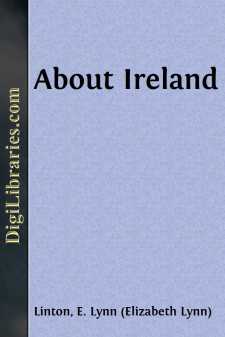Categories
- Antiques & Collectibles 13
- Architecture 36
- Art 48
- Bibles 22
- Biography & Autobiography 813
- Body, Mind & Spirit 142
- Business & Economics 28
- Children's Books 15
- Children's Fiction 12
- Computers 4
- Cooking 94
- Crafts & Hobbies 4
- Drama 346
- Education 46
- Family & Relationships 57
- Fiction 11829
- Games 19
- Gardening 17
- Health & Fitness 34
- History 1377
- House & Home 1
- Humor 147
- Juvenile Fiction 1873
- Juvenile Nonfiction 202
- Language Arts & Disciplines 88
- Law 16
- Literary Collections 686
- Literary Criticism 179
- Mathematics 13
- Medical 41
- Music 40
- Nature 179
- Non-Classifiable 1768
- Performing Arts 7
- Periodicals 1453
- Philosophy 64
- Photography 2
- Poetry 896
- Political Science 203
- Psychology 42
- Reference 154
- Religion 513
- Science 126
- Self-Help 84
- Social Science 81
- Sports & Recreation 34
- Study Aids 3
- Technology & Engineering 59
- Transportation 23
- Travel 463
- True Crime 29
About Ireland
Categories:
Description:
Excerpt
I.
Nothing dies so hard as prejudice, unless it be sentiment. Indeed, prejudice and sentiment are but different manifestations of the same principle by which men pronounce on things according to individual feeling, independent of facts and free from the restraint of positive knowledge. And on nothing in modern times has so much sentiment been lavished as on the Irish question; nowhere has so much passionately generous, but at the same time so much absolutely ignorant, partisanship been displayed as by English sympathisers with the Irish peasant. This is scarcely to be wondered at. The picture of a gallant nation ground under the heel of an iron despotism—of an industrious and virtuous peasantry rackrented, despoiled, brutalised, and scarce able to live by their labour that they may supply the vicious wants of oppressive landlords—of unarmed men, together with women and little children, ruthlessly bludgeoned by a brutal police, or shot by a bloodthirsty soldiery for no greater offence than verbal protests against illegal evictions—of a handful of ardent patriots ready to undergo imprisonment and contumely in their struggle against one of the strongest nations in the world for only so much political freedom as is granted to-day by despots themselves—such a picture as this is calculated to excite the sympathies of all generous souls. And it has done so in England, where "Home Rule" and "Justice to Ireland" have become the rallying cries of one section of the Liberal party, to the disruption and political suicide of the whole body; and where the less knowledge imported into the question the more fervid the advocacy and the louder the demand.
It is worth while to state quite quietly and quite plainly how things stand at this present moment. There is no need for hysterics on the one side or the other; and to amend one's views by the testimony of facts is not a dishonest turning of one's coat—if confession of that amendment is a little like the white sheet and lighted taper of a penitent. Things are, or they are not. If they are, as will be set down, the inference is plain to anyone not hopelessly blinded by preconceived prejudice. If they are not, let them be authoritatively contradicted on the basis of fact, not sentiment—demonstration, not assertion. In any case it is a gain to obtain material for a truer judgment than heretofore, and thus to be rid of certain mental films by which colours are blurred and perspective is distorted.
No one wishes to palliate the crimes of which England has been guilty in Ireland. Her hand has been heavy, her whip one of braided scorpions, her rule emphatically of blood and iron. But all this is of the past, and the pendulum, not only of public feeling but of legal enactment, threatens to swing too far on the other side. What has been done cannot be undone, but it will not be repeated. We shall never send over another Cromwell nor yet another Castlereagh; and there is as little good to be got from chafing over past wrongs as there is in lamenting past glories....



